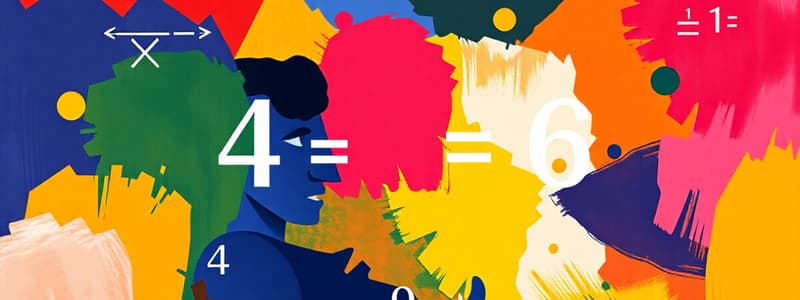Podcast
Questions and Answers
Mathematics is the study of quantity, structure, space, and change.
Mathematics is the study of quantity, structure, space, and change.
True (A)
Arithmetic only deals with addition and subtraction operations.
Arithmetic only deals with addition and subtraction operations.
False (B)
Algebra focuses on solving for variables using equations and inequalities.
Algebra focuses on solving for variables using equations and inequalities.
True (A)
Geometry is unrelated to the concept of angles.
Geometry is unrelated to the concept of angles.
Calculus is primarily concerned with discrete quantities.
Calculus is primarily concerned with discrete quantities.
Statistics involves measures of central tendency like mean, median, and mode.
Statistics involves measures of central tendency like mean, median, and mode.
Sets in mathematics do not have any operations associated with them.
Sets in mathematics do not have any operations associated with them.
Discrete mathematics includes topics such as graph theory and combinatorics.
Discrete mathematics includes topics such as graph theory and combinatorics.
Flashcards
What is mathematics?
What is mathematics?
The study of quantity, structure, space, and change using symbolic language.
What is arithmetic?
What is arithmetic?
Basic operations like addition, subtraction, multiplication, and division, along with properties like commutativity and associativity.
What is algebra?
What is algebra?
Using variables to represent unknown quantities and solving equations and inequalities.
What is geometry?
What is geometry?
Signup and view all the flashcards
What is calculus?
What is calculus?
Signup and view all the flashcards
What is statistics?
What is statistics?
Signup and view all the flashcards
What is discrete mathematics?
What is discrete mathematics?
Signup and view all the flashcards
What are sets and logic?
What are sets and logic?
Signup and view all the flashcards
Study Notes
Fundamental Concepts
- Mathematics studies quantity, structure, space, and change.
- Symbolic language represents and manipulates these concepts.
- Key branches are arithmetic, algebra, geometry, calculus, and statistics.
Arithmetic
- Basic operations: addition, subtraction, multiplication, division.
- Properties: commutativity, associativity, distributivity.
- Number systems: natural numbers, integers, rational numbers, irrational numbers, real numbers.
- Prime numbers, factors, and multiples are covered.
Algebra
- Variables represent unknown quantities.
- Equations and inequalities are solved for variables.
- Includes linear, quadratic, and systems of equations.
- Polynomial expressions and functions (factoring, expanding).
- Concepts of exponents, radicals, and logarithms are explored.
Geometry
- Studies shapes, sizes, and positions of figures in space.
- Plane and solid geometry (2D and 3D shapes).
- Angles, triangles, quadrilaterals, circles, and volume.
- Congruence and similarity relationships.
- Coordinate geometry links geometry to algebra.
Calculus
- Deals with continuous change and motion.
- Differential and integral calculus (rates of change and accumulation).
- Derivatives and integrals, optimization problems.
- Widely used in physics, engineering, and economics.
Statistics
- Collects, analyzes, and interprets data.
- Measures of central tendency (mean, median, mode), dispersion (variance, standard deviation).
- Analyzing populations, conducting experiments, making predictions.
- Probability, sampling, hypothesis testing, data visualization.
- Used across diverse fields, from social sciences to business.
Sets and Logic
- Concepts of sets and their operations.
- Relationships between sets using Venn diagrams.
- Logical statements and connectives ('and', 'or', 'not').
- Arguments, proofs, and mathematical reasoning.
Discrete Mathematics
- Focuses on countable or discrete structures.
- Graph theory, combinatorics, and logic are included.
- Useful in computer science and fields dealing with finite objects.
Number Theory
- Studies properties of integers and their relationships.
- Prime numbers, divisibility, and modular arithmetic are covered.
- Applications include cryptography.
Linear Algebra
- Focuses on vector spaces and linear transformations.
- Matrices, systems of linear equations, and eigenvalues are introduced.
- Essential in scientific and engineering fields.
Studying That Suits You
Use AI to generate personalized quizzes and flashcards to suit your learning preferences.
Description
This quiz explores the essential concepts of mathematics, including arithmetic, algebra, and geometry. It covers basic operations, variables, equations, and shapes, providing a comprehensive overview of key mathematical principles. Perfect for students looking to test their understanding of fundamental mathematical ideas.




